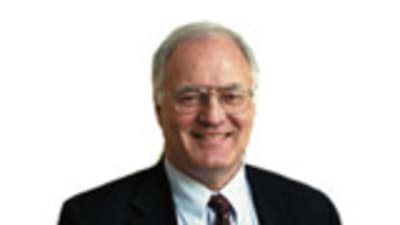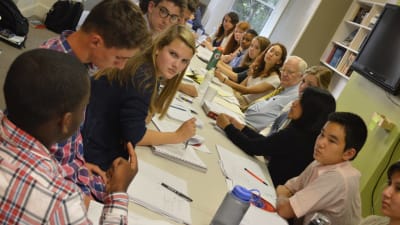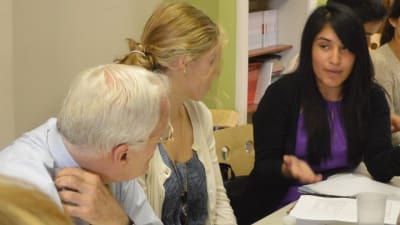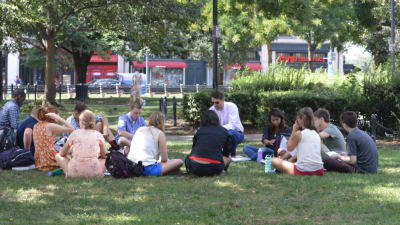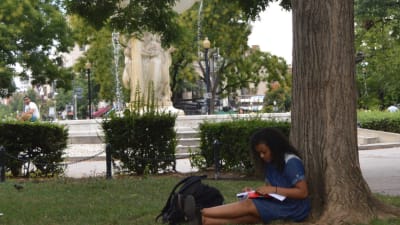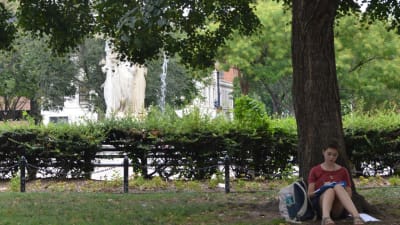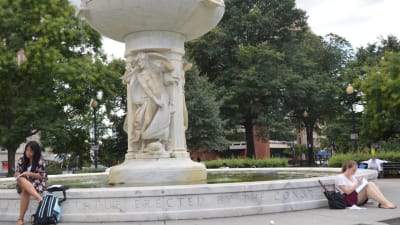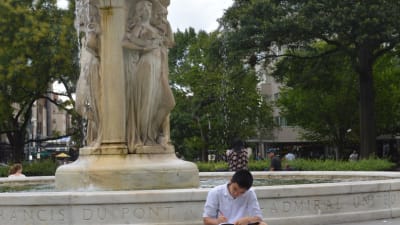Speakers, Skittles, and Science: Fall 2014’s First Week
It’s hard to believe that just one week ago our 24 extraordinary students had never met each other. After just seven days, they are already becoming a family.
On Monday morning, we dove straight into Ethics & Leadership class with a longstanding SEGL tradition: the Infamous Skittles Scenario. Over the course of forty-five minutes, our students put their ethical thinking skills to the test as they asked themselves some of life’s most challenging questions: How would you live if there were no rules? Are humans innately altruistic or selfish? What is the ideal form of government? Along the way, they “shot” each other, helped each other recover from various ailments, and consumed many Skittles. (You can read the Skittles Scenario “assignment” sheet here.)
After this exercise and an ensuing discussion, we delivered a brief introductory lecture on three classic Western ethicists: Aristotle, Kant, and John Stuart Mill. Their philosophies are just one tool these students will acquire over the course of the semester as they learn to make and evaluate ethical leadership choices, and they will return to the ideas of these three thinkers throughout their time at SEGL.
Later on Monday, we had our first Academic classes. Among other first day activities, English students walked to Dupont Circle to start their weekly English journals with inspiration from Ernest Hemingway:
But sometimes when I was starting on a new story and I could not get going, I would…think, “Do not worry. You have always written before and you will write now. All you have to do is write one true sentence. Write the truest sentence you know.” So finally I would write one true sentence, and then go on from there. It was easy then because there was always one true sentence that I knew or had seen or had heard someone say. If I started to write elaborately, or like someone introducing or presenting something, I found that I could cut the scrollwork or ornament out and throw it away and start with the first true simple declarative sentence I had written.
On Wednesday morning, we delivered one of several first week orientation sessions that help students adapt to SEGL’s learning culture: an exploration of the latest scientific research about how students learn. Many students were surprised to discover, for example, that most current science shows that intelligence is malleable, and that students who believe this perform much better on tests. In fact, praising students for “being smart” can be detrimental; praising them for “working hard” usually produces better results. And working hard means operating at the outer limits of what your brain is currently capable of–despite the many mistakes this will cause, it is the fastest way to progress. (If you would like to read more, check out The Talent Code by Daniel Coyle and Why Don’t Students Like School? by Daniel T. Willingham.) Our faculty members have been trained in this science and use it to assist their teaching.
We then welcomed Egil “Bud” Krogh for the first of two visits. Known to historians as the Director of Nixon’s White House Plumbers (which investigated and attempted to discredit Daniel Ellsburg after the release of the Pentagon Papers) he is also the author of Integrity: Good People, Bad Choices, and Life Lessons from the White House. Many students found him to be a master storyteller: he shared the now-famous tale of Elvis Presley’s visit to the White House (Krogh, Elvis, and Nixon were the only officials in the Oval Office that day), a cautionary anecdote about the fat content in the hot dog, a story about his intuition and a Supreme Court nominee who might have been racially biased, and an insider account about the illegal break-in he authorized at Dr. Lewis Fielding’s office in the wake of the release of the Pentagon Papers.
Each story was designed to help students remember one of their most important take-aways of the semester: Krogh’s “Integrity Zone” decision making matrix. The system helps students recognize when their decisions might be affected by internal and external threats to Integrity (for example, “groupthink,” “pressure for results,” and “arrogance”). It also helps them understand why others–like Krogh–might have made wrong turns.
Following Krogh’s visit, SEGL Board of Trustees Board Vice Chair Paige Cottingham-Streater joined us for a session on cross-cultural ethics. As Executive Director of the Japan-U.S. Friendship Commission, a federal agency designed to foster scholarly, cultural and public affairs activities between the two countries, she faces a different set of values and assumptions every day. Finding ways to bridge the primarily Western values and worldview that inform U.S. policymakers and the values and world views of foreign policymakers is an essential 21st century leadership skill, and Cottingham-Streater’s presentation gave the students much to reflect on.
On Friday, Krogh returned to SEGL for the first “Master Class” of the semester. Our “Master Classes”–intensive interactive sessions in which students have their work critiqued by experts–are special semester highlights. Over the course of several hours, Krogh walked students through a real, life-and-death crisis that he handled during his career at the White House, engaging the students in an intense discussion of how best to resolve it. Serving as mock White House advisors, the students offered intense, divergent, and thoughtful opinions on the best multifaceted, time-sensitive course of action. The conversation was fiery and showcased many different opinions, but you’ll have to ask the students themselves for more details – we don’t want to spoil the surprise real-life ending for future semesters!
(Krogh also helps to lead SEGL’s ethics training program for businesses and organizations. For information on this professional development program, click here.)
Speaking of the weekend, we’ll launch into this one with a viewing of the PBS Frontline documentary “Ghosts of Rwanda” on Friday night. This will serve as the lead-in to next week’s case study on the Rwandan genocide. Meanwhile, there will also be plenty of time for exploring the neighborhood and for relaxing after this densely packed first week. It looks like the heat will break this weekend, and next week will cool to the 70s. As we get into a rhythm with our exercise program, our outdoor runners will be glad for the change!
